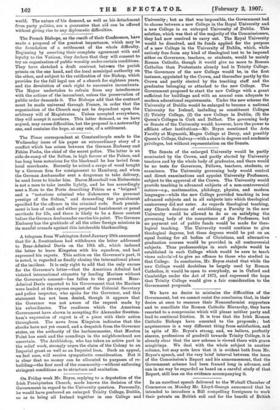The Senate of the enlarged University would be partly nominated
by the Crown, and partly elected by University teachers and by the whole body of graduates, and there would be no tests for Governors, Fellows, teachers, students, or examiners. The University governing body would control and direct examinations and appoint University Professors, subject to the approval of the Crown. The University would provide teaching in advanced subjects of a non-controversial nature—e.g., mathematics, philology, physics, and modern languages—while the new College provided teaching in less advanced subjects and in all subjects into which theological controversy did not enter. As regards theological teaching, any Church desirous of establishing a Faculty in the new University would be allowed to do so on satisfying the governing body of the competence of the Professors, but no payment out of public funds would be made for theo- logical teaching. The University would continue to give theological degrees, but these degrees would be put on an equal footing for all bodies of Christians, and alternative graduation courses would be provided in all controversial subjects. Thus professorships in such subjects would be established in each College which would be sure to teach views calculated to give no offence to those who studied in that College. In conclusion, Mr. Bryce stated that while the new College would doubtless be largely used by Roman Catholics, it would be open to everybody, as in Oxford and Cambridge under the Act of 1871, and expressed the hope that Trinity College would give a fair consideration to the Government proposals.






































 Previous page
Previous page